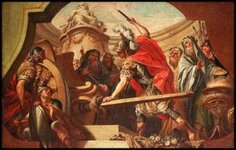Thought I'd share this excerpt for consideration
Literature's sole law ...
...'everything has to submit to form.If any of literature's other elements are stronger than form, such as style, plot, theme, if any of these take control over form, the result is poor. That is why writers with a strong style often write poor books. That is also why writers with strong themes so often write poor books. Strong themes and styles have to be broken down before literature can come into being. It is this breaking down that is called 'writing.' Writing is more about destroying than creating.'
Karl Ove Knauusgard My Struggle 1: A Death In The Family.
He was writing about his early writing failures. We need to cut all Gordion knots, and deconstruct, I think he is saying. Like taking a jigsaw apart. We know what the picture will be once it's put back together, but our job, writing a novel, is to make the reader put the pieces together.

Literature's sole law ...
...'everything has to submit to form.If any of literature's other elements are stronger than form, such as style, plot, theme, if any of these take control over form, the result is poor. That is why writers with a strong style often write poor books. That is also why writers with strong themes so often write poor books. Strong themes and styles have to be broken down before literature can come into being. It is this breaking down that is called 'writing.' Writing is more about destroying than creating.'
Karl Ove Knauusgard My Struggle 1: A Death In The Family.
He was writing about his early writing failures. We need to cut all Gordion knots, and deconstruct, I think he is saying. Like taking a jigsaw apart. We know what the picture will be once it's put back together, but our job, writing a novel, is to make the reader put the pieces together.

Last edited:
